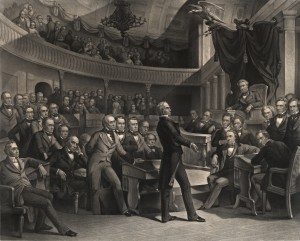
History has, in a very small way, been made today. I have written my first blogpost with a Latin title. I could easily have titled it in English but let’s face it: Latin is cooler. “Ubi decus moritur, homo est mortuus” roughly translates to “When honor dies, the man is dead.” I can’t honestly or honorably take credit for that claim. It comes from John Greenleaf Whittier’s poem, “Ichabod”. This poem was Whittier’s piece of protest against the Fugitive Slave Act of 1850 and more specifically, Senator Daniel Webster’s support of it.
Webster, a Senator from New Hampshire and popularly revered in the North as a lion of New England resistance against the Southern “slave power”, was one of the greatest figures in the antebellum Congress, standing among men like Henry Clay and John Calhoun. Webster supported the Fugitive Slave Act of 1850 however and this resulted in a loss of reverance from many New Englanders, including the fervent abolitionist poet, John Greenleaf Whittier.
The Fugitive Slave Act of 1850 was one bill in the Compromise of 1850. It declared that fugitive slaves would be returned to their masters in the South if they were caught in the North. Abolitionists were outraged at the passage of the law and many in New England, Whittier among them, were outraged that their fearless patriot, Daniel Webster, had voted for it in an attempt at compromise. Webster, known for his declaration that “Liberty and Union, now and forever, [are] one and inseperable”, no doubt desired the preservation of Union over the blocking of the Fugitive Slave Law. Webster’s priorities did not align with those of the New England abolitionists and this caused his “fall from glory”.
One stanza of “Ichabod”, (Hebrew for “inglorious”), reads as follows: “All else is gone from those great eyes, the soul has fled, faith is lost, when honor dies, the man is dead.” Whittier’s words are timeless and they ring loud and true today. We live in an age of desperate moral crusades and counter-crusades and equally-desperate attempts at compromise and reconciliation. You can’t reconcile right and wrong however, compromise in the face of evil is evil itself. To make friends with the enemy is to lose faith, flee and die, to be laid to rest in a grave next to that of your honor. There are Websters today, just as there are Fugitive Slave Acts. They may have different names but the story continues in perpetual cycles, honor dies and with it die the souls and passion of men.
